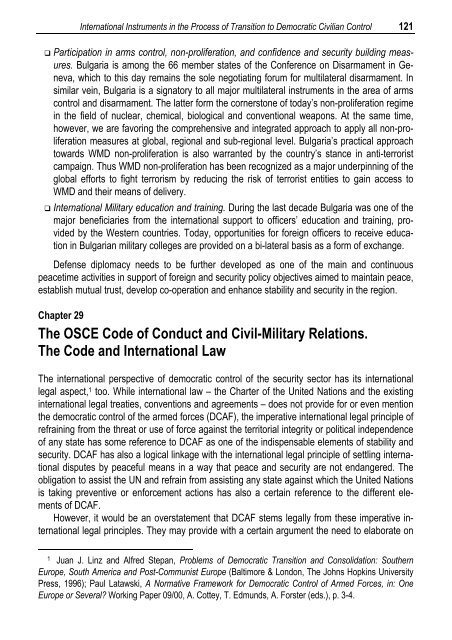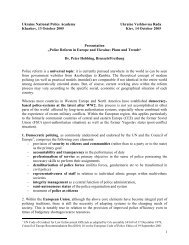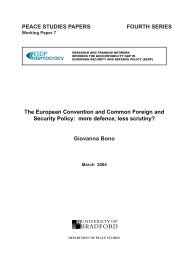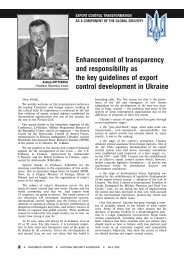Civil-Military Relations and Democratic Control of the Security Sector
Civil-Military Relations and Democratic Control of the Security Sector
Civil-Military Relations and Democratic Control of the Security Sector
You also want an ePaper? Increase the reach of your titles
YUMPU automatically turns print PDFs into web optimized ePapers that Google loves.
International Instruments in <strong>the</strong> Process <strong>of</strong> Transition to <strong>Democratic</strong> <strong>Civil</strong>ian <strong>Control</strong><br />
Participation in arms control, non-proliferation, <strong>and</strong> confidence <strong>and</strong> security building measures.<br />
Bulgaria is among <strong>the</strong> 66 member states <strong>of</strong> <strong>the</strong> Conference on Disarmament in Geneva,<br />
which to this day remains <strong>the</strong> sole negotiating forum for multilateral disarmament. In<br />
similar vein, Bulgaria is a signatory to all major multilateral instruments in <strong>the</strong> area <strong>of</strong> arms<br />
control <strong>and</strong> disarmament. The latter form <strong>the</strong> cornerstone <strong>of</strong> today’s non-proliferation regime<br />
in <strong>the</strong> field <strong>of</strong> nuclear, chemical, biological <strong>and</strong> conventional weapons. At <strong>the</strong> same time,<br />
however, we are favoring <strong>the</strong> comprehensive <strong>and</strong> integrated approach to apply all non-proliferation<br />
measures at global, regional <strong>and</strong> sub-regional level. Bulgaria’s practical approach<br />
towards WMD non-proliferation is also warranted by <strong>the</strong> country’s stance in anti-terrorist<br />
campaign. Thus WMD non-proliferation has been recognized as a major underpinning <strong>of</strong> <strong>the</strong><br />
global efforts to fight terrorism by reducing <strong>the</strong> risk <strong>of</strong> terrorist entities to gain access to<br />
WMD <strong>and</strong> <strong>the</strong>ir means <strong>of</strong> delivery.<br />
International <strong>Military</strong> education <strong>and</strong> training. During <strong>the</strong> last decade Bulgaria was one <strong>of</strong> <strong>the</strong><br />
major beneficiaries from <strong>the</strong> international support to <strong>of</strong>ficers’ education <strong>and</strong> training, provided<br />
by <strong>the</strong> Western countries. Today, opportunities for foreign <strong>of</strong>ficers to receive education<br />
in Bulgarian military colleges are provided on a bi-lateral basis as a form <strong>of</strong> exchange.<br />
Defense diplomacy needs to be fur<strong>the</strong>r developed as one <strong>of</strong> <strong>the</strong> main <strong>and</strong> continuous<br />
peacetime activities in support <strong>of</strong> foreign <strong>and</strong> security policy objectives aimed to maintain peace,<br />
establish mutual trust, develop co-operation <strong>and</strong> enhance stability <strong>and</strong> security in <strong>the</strong> region.<br />
Chapter 29<br />
The OSCE Code <strong>of</strong> Conduct <strong>and</strong> <strong>Civil</strong>-<strong>Military</strong> <strong>Relations</strong>.<br />
The Code <strong>and</strong> International Law<br />
The international perspective <strong>of</strong> democratic control <strong>of</strong> <strong>the</strong> security sector has its international<br />
legal aspect, 1 too. While international law – <strong>the</strong> Charter <strong>of</strong> <strong>the</strong> United Nations <strong>and</strong> <strong>the</strong> existing<br />
international legal treaties, conventions <strong>and</strong> agreements – does not provide for or even mention<br />
<strong>the</strong> democratic control <strong>of</strong> <strong>the</strong> armed forces (DCAF), <strong>the</strong> imperative international legal principle <strong>of</strong><br />
refraining from <strong>the</strong> threat or use <strong>of</strong> force against <strong>the</strong> territorial integrity or political independence<br />
<strong>of</strong> any state has some reference to DCAF as one <strong>of</strong> <strong>the</strong> indispensable elements <strong>of</strong> stability <strong>and</strong><br />
security. DCAF has also a logical linkage with <strong>the</strong> international legal principle <strong>of</strong> settling international<br />
disputes by peaceful means in a way that peace <strong>and</strong> security are not endangered. The<br />
obligation to assist <strong>the</strong> UN <strong>and</strong> refrain from assisting any state against which <strong>the</strong> United Nations<br />
is taking preventive or enforcement actions has also a certain reference to <strong>the</strong> different elements<br />
<strong>of</strong> DCAF.<br />
However, it would be an overstatement that DCAF stems legally from <strong>the</strong>se imperative international<br />
legal principles. They may provide with a certain argument <strong>the</strong> need to elaborate on<br />
1 Juan J. Linz <strong>and</strong> Alfred Stepan, Problems <strong>of</strong> <strong>Democratic</strong> Transition <strong>and</strong> Consolidation: Sou<strong>the</strong>rn<br />
Europe, South America <strong>and</strong> Post-Communist Europe (Baltimore & London, The Johns Hopkins University<br />
Press, 1996); Paul Latawski, A Normative Framework for <strong>Democratic</strong> <strong>Control</strong> <strong>of</strong> Armed Forces, in: One<br />
Europe or Several? Working Paper 09/00, A. Cottey, T. Edmunds, A. Forster (eds.), p. 3-4.<br />
121

















